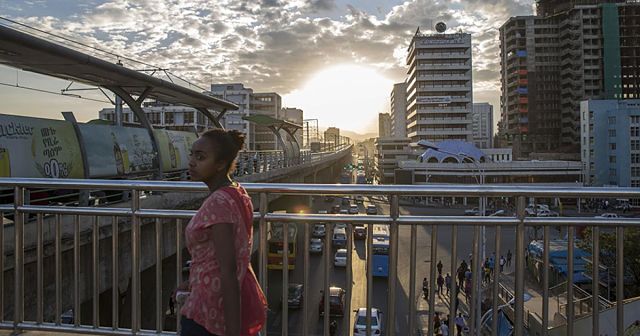 A woman walks on bridge to a station of the city's light railway, in Addis Ababa. (AP Photo/Mulugeta Ayene)
A woman walks on bridge to a station of the city's light railway, in Addis Ababa. (AP Photo/Mulugeta Ayene)
Ethiopia Lets in Human Rights Watch for First Time in 8 Years
After more than two years of protests, power changed hands in Ethiopia last April. Under the new Prime Minister Abiy Ahmed, Ethiopia is shedding its reputation as a country that tortures detainees and spies on its citizens. The authorities have released thousands of political prisoners and dismissed some abusive security force officers. The decades-long conflict with neighboring Eritrea came to an end. And for the first time in eight years, Human Rights Watch staff who cover Ethiopia were permitted to visit the country. Senior Researcher Felix Horne talks with Amy Braunschweiger about these exciting steps forward, as well as his concerns about rising tensions among ethnic groups in the country’s rural areas.
How has Ethiopia changed since you were last there?
Addis Ababa, the capital, has changed so much. Unlike before, modern asphalt roads are everywhere, there are freeways, tall, modern shiny buildings, lots of new restaurants, and a light rail system. It used to smell of smoke, from people burning wood to prepare food, but that smell is now gone. People seemed to feel much more free to express their opinions. They were speaking very openly about sensitive subjects in public spaces, cafes, and mini buses. That’s not the Addis I knew, where everyone was looking over their shoulder to see who was eavesdropping.
You went specifically for a workshop on rebuilding civil society. What did you learn?
Under the 2009 Charities and Societies Proclamation, civil society groups working on human rights issues in Ethiopia was decimated. Most nongovernmental organizations (NGOs) were closed. Others had their bank accounts frozen. But a new law was passed earlier this month. It eliminates most of the draconian restrictions from previous legislation. The new agency registering NGOs needs to get up and running and that will take time, but we hope NGOs will be able to register soon, which will open up possibilities for funding. Then they can document abuses and advocate for respect for human rights, which is critical ahead of the May 2020 elections.
What was the workshop like?
There was a feeling of newfound optimism there. Still, it was starkly evident the extent to which civil society working on human rights has been decimated since the Charities and Societies Proclamation was passed 10 years ago. It will clearly take time for the sector to recover. At the workshop, international and Ethiopian NGOs, such as the Human Rights Council of Ethiopia and the Consortium of Ethiopian Rights Organizations, discussed advocacy strategies and research gaps, and talked about economic, social, and cultural rights. It was a chance for everyone to get together in person. There were people there who I knew quite well but had never actually met. It was nice to put faces to names.
Did anything surprise you?
Some of the activists organized a press conference at the end of the workshop, and I honestly didn’t expect much media interest. But 60 journalists showed up, and most were from the state media. When I talked about how it was our first visa in eight years, there was applause. They asked questions about what work we planned to do in Ethiopia and if we’d open up an office there.
State media never covered our work in the past, and that has clearly changed. But media is still publishing a pro-government prospective. For example, we spoke about all the great reforms happening, and we also talked about our concerns. But most of the media never reported on the concerns.
I have this memory from the press conference, when, among the microphones was one from ETV, which is the main state broadcaster, and next to it was one from OMN, the Oromia Media Network, which used to be banned in Ethiopia. The former government went to great lengths to jam OMN’s television broadcasts and had unfairly charged it under the counterterrorism law. It was great to see them side-to-side and a powerful image of change in the media landscape.
—
Join the conversation on Twitter and Facebook.

























